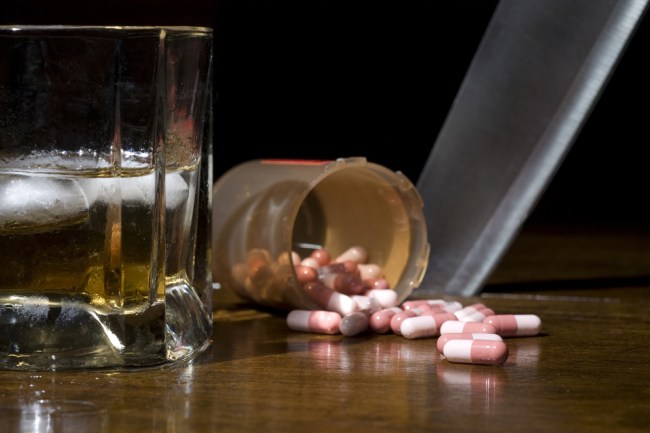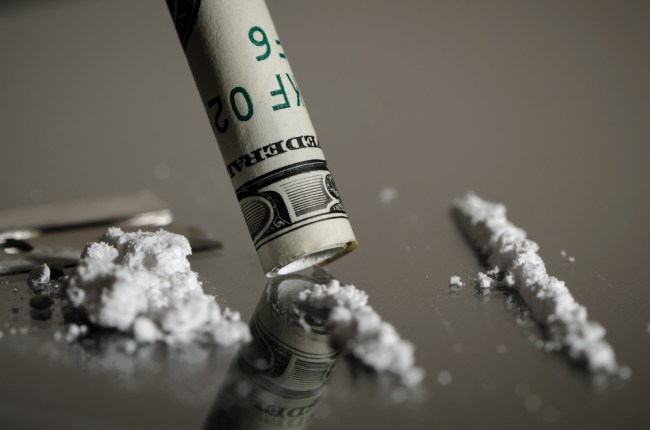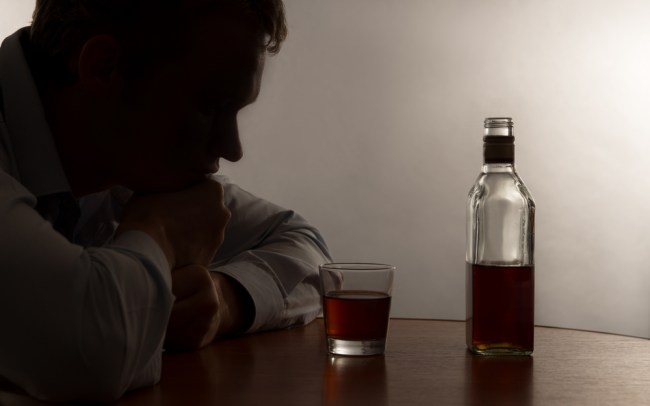
The police officer keeps pressing his cold, heavy hand against my face. He’s probably thinking that I’m dead. Or might die. Or maybe that I deserve to be dead. Truth is, that would probably be easier on my family.
***
The first thing I felt when I woke up was someone smacking me on the right side of my face. I remember wondering what the cop who woke me up thought. I suppose it’s not too much of a mystery:
Another alcoholic piece of sh*t.
“Sir, you’ve been in an accident,” he said.
“No I haven’t,” I responded.
Splintered shards of glass dusted the dashboard and zig-zagging fractures ran the length of the windshield. I realized that I might have spoken too soon. Then I noticed the tree. It was only a couple of feet away from my legs; my Ford Focus’ front-end had wrapped around it, forming a U-shape.
I hadn’t used that day. I wasn’t drunk or stoned. The reason I smashed my car into a tree doing 40 mph is because I had a seizure, the result of attempting to quit both booze and Xanax cold turkey.
The trouble had started several hours earlier. I hadn’t known that booze and Xanax work on the same cell receptors and that trying to withdraw from both at once was extremely dangerous. I was working at my office job when strange sensations began shooting though my body. It felt like my guts were being electrocuted. Tingling waves coursed through me, and within minutes, I crumpled in my desk chair. Then came the nausea.
I’d never had such an intense withdrawal before, but I was at the tail end of a months long bender and had now been away from any substance for what felt like a lifetime. It had actually been 10 hours.
I left work, and began the one hour trek back to my mother’s home. This is the junkie’s life: my car was borrowed and I had nowhere to live. I’d had stuff before — a BMW, girlfriends, apartments, jobs, friends, money. Now I had none of it. I was in the midst of rebuilding, at least that’s what I told myself. In actuality, I was still busy tearing everything apart. With every swig of vodka (usually to chase a pill), I shredded my life a little further.
That electrocution feeling wasn’t going away. In fact, the intervals increased in duration and frequency. Then…darkness.
When they loaded me onto a gurney, I felt sharp pains in my wrists. Later, I found out that both of my shoulders were dislocated. It’s tough to say what did the damage. It was either the convulsions from the seizure, or the impact of the wreck. Maybe both. The only witness to the accident said I was air drumming before I hit the pole. That must be what a seizure looks like.
I boozed for several more weeks after the accident until one day, in a drunken stupor, I fell on my knees and began to pray.
“God,” I cried, “please take this obsession away from me. Please give me the strength to fight back against this demon.”
I don’t necessarily believe in the Almighty, but when a man’s had enough, he’s had enough. I knew I needed help. Several days later, I entered my first rehab facility. It was a 30 day stay and it kept me sober for eight months.
Then the hole in my soul began spreading again, begging to be filled. I obliged.
***
It’s tough to say when the trouble started. Drug and alcohol addiction is a gradual thing. I was only 12 when I first smoked pot in my friend’s backyard. I was an introverted bookworm; my parents would literally kick me out of the house so that I’d go meet other kids. I’d ride my bike around the neighborhood late at night by myself, looking at the stars and talking to what I thought was a higher power.
When I discovered weed, it was like those skies opened up and began talking back. I felt more comfortable than I ever had. It was a revelation.
When I was 18, I was prescribed Percocet following shoulder surgery. The old me — the shy, introverted, insecure self — faded further away. I was suddenly talkative, charming, and bright. The life of the party. In university, my habits picked up. I sold weed and smoked the profits. I started experimenting with hallucinogens. When I loved a substance it quickly became integrated into my routine.
I took a break from university to spend a year in New Mexico. It was there, in an attic with a team of film and TV professionals, that I discovered cocaine. I hated putting stuff up my nose, but the rush that it gave me was too good to deny.

I went back to Jersey, returned to school, got a full-time managerial position, and started building my life. All this time, my addictions progressed. Coke, weed, booze, mushrooms, and a newfound love, ecstasy. I was selling the stuff, too. I would routinely go to classes while tripping on a combination of ecstasy and acid. Xanax entered the picture at some point. Point being, I was not a discriminating druggie.
For the most part, I was a functioning addict — working and going to classes but always under a haze. It couldn’t last. I passed out mid-sentence one day, while talking to a customer in my retail job. When I came to, she sneered and left. When I wasn’t in class or working, all bets were off. Although I purchased a home with my girlfriend at the time, she would rarely see me from Friday through Sunday.
I was still in my early twenties, and it was at this point that I really started to drink. I’d show up to every party with a bottle of Wild Turkey 101 and no plans to share it. The alcohol dropped my inhibitions, and soon I moved on to the sorts of substances I swore I’d never try. I lost count of the times I came to with a crack pipe in my hand on the outskirts of New Jersey. One night, after swallowing a handful of ecstasy tablets and drinking a full bottle of Wild Turkey at a seedy strip club, I woke up to find myself driving — it was the first of many blackouts. A few weeks later, a saleswoman at the store I managed found me face down in a small mound of cocaine.
I wasn’t the least bit afraid of the monster I’d become. I loved waking up in crack houses at 3 a.m. I loved going to strip clubs and discreetly pushing tabs of ecstasy through my lips. I adored the warm feeling of booze entering my system. Hanging in rough areas, conversing with seedy types, selling drugs — I felt like a rebel. With one pocket full of cash and the other full of pills, I could rule the world. I could talk to anyone, be anyone. I had no fear.
Everyone does drugs. Everyone likes me.
My first real scare came when I ingested so many ecstasy pills in one night that I spent the next day sprawled next to a toilet, vomiting every 20 minutes. That afternoon, at work, I broke into an uncontrollable sob. Soon, I lost my retail management job and my home; I moved into an apartment and secured another position in sales, and for a short time, I was able to manage my addictions. I still didn’t think I had a problem.
During this time, I really started to focus on booze. It’s cheap and easy to buy. I was drinking heavily every night, and all through the weekends. I wouldn’t go to work drunk, but I was always hungover, and I attempted to combat that terrible feeling with pot and Percocet. My job performance began to suffer and I called out sick on the days my hangovers were too intense. I lost that job, too, but I was happy on unemployment. You can buy a cut-rate half gallon of vodka for $10.
The disease marched forward like a cancer. Without work, I spent my days in a haze, drinking to get out of bed in the morning and drinking just to sleep. Normal functions — eating, going to the bathroom, sleeping — became impossible without at least a pint of vodka in my stomach. My intake was insane, sometimes as much as a gallon of vodka per day. Using was no longer sexy like it had been in my early 20s. I was running out of friends because I wouldn’t answer the phone. Money was scarce. My few relationships with women always ended with them hating me.
What had started off as a way to get out of myself, a way to not feel alone in this world, had turned into a cycle of self-centered despair. Addiction is like a hamster wheel lined with barbed wire. It’s a continuous miserable loop. I was drinking just to stave off the shakes, the nausea, the acute withdrawal symptoms. If I had to go out somewhere, I’d swig at least a pint just to keep myself from throwing up in public.
I kept a trash can next to my mattress so I could vomit into it throughout the night. I would wake up several times just to take a few shots so I could go back to sleep. My morning routine consisted of me sitting outside of a liquor store at 8:45 in the morning, praying — between bouts of vomiting — that the manager would open the store soon. This happened every single f*cking day.
“This is it, Dariel,” I’d say to myself. “Just today and then you’re done.”
I started having health problems. I was hospitalized twice. I lost unemployment, my car was repossessed, and I was kicked out of three different rentals. I had an uncanny ability to find new rock bottoms.
When I finally arrived back at my mother’s house, I made a decision to get sober. Again, for a while, it worked. I still wasn’t confronting my disease, but I started reforming some of my bad habits. I worked out religiously, ate right, got into the best shape of my life, and drank sparingly. I found an office job that paid well, and I met the woman who would later become my fiancée. To help battle the anxiety that crippled me and pushed me towards the bottle, I was prescribed Xanax. Of course, like everything else, I abused it.
I got comfortable at my job and booze crept back in again. Then, the car crash.

After the crash, and after a 30-day stay in a rehab facility, I stayed straight — not a drop of booze, not a puff of weed, not a single pill — for eight months. Something that one of my counselors said to me had stuck.
“I’ll show you. I’ll hurt me,” he’d say.
That was my self-destructive thought process. I just wanted to hurt myself.
Throughout that eight month period of sobriety, I didn’t do the work. I didn’t go to meetings. I didn’t read the literature provided to me by AA. I didn’t have a sponsor. Addiction is persistent. If left untreated, it will rear its ugly head again. What started off as just a few shots of vodka turned into drinking at work, something I’d vowed never to do. Then it turned into drinking on the way to the office, during work, and on the ride back home. I entered another treatment program, this time an outpatient facility, but I drank during the majority of my stay there. My father was dying from cancer and my fiancée was pregnant. I dealt with the stress by drinking more.
When I was offered a job writing online, I quit my office gig. My last day in the office was on a Friday, and to celebrate, I decided to post up in a parking lot and drink a pint of my favorite brand of vodka. Afternoon turned to night and I bought another pint. Then another. My fiancée texted me over and over, asking when I’d be home. I didn’t answer, just went on drinking in the parking lot until I passed out.
The next morning, my family and friends had grown panicked, but I stayed put. Dozens of calls and texts came in. I just drank more. Finally, after two days of this, I received a text from a police officer in the family — who said that my parents were about to file out a missing persons report. My father, even in his weakened state, was out searching for me. I went home.
You’d think all of this would be enough to deter someone to never drink again. To give up the bottle for good. Nope. I did the same thing just one month later, disappearing for a whole day while my pregnant fiancée and cancer-ridden father mustered up a search party.
I always joked to myself — whenever I disappeared — that all anyone had to do to find me was follow the “parking lot puddles.” The puddles outside my driver’s side door were part Gatorade (I had to make room in the bottle for vodka), part vomit, and part tears. That’s the thing about the throes of addiction — you’re always chasing that first high, but at the end, when you’re physically addicted, it’s not fun anymore. You cry and then chase those feeling with booze.
I started stealing stuff and selling it to pawn shops for drug money. When my father died, I sold most of the belongings he left behind. My cherished music equipment went to the pawn shop too. So did my comic books. Just about anything I could grab was sold.
As hard as it is to say exactly when my addiction started — part of me thinks I was born an addict — it’s equally as hard to say when my earnest attempt at sobriety began. I knew before my first stint in rehab that I wanted to get clean. But it took a third time in a rehab facility to finally get the message to stick. To be honest, I love drugs and alcohol. Losing them felt like losing my best friend. I never wanted to give them up, and to the day I die I’ll probably still adore them.
And that is what makes me an addict. If there were no repercussions from my substance-abuse, I wouldn’t be interested in writing this right now. I’d be getting high.
***
From the day that I learned that I’d die eventually, I always thought, What the f*ck is any of this worth? But now, when I walk in the door and see my daughter’s face, I feel like I have something to fight for. It sounds silly, because everyone says, “Your life is going to change when you have a child.” I never believed them. But, it’s true. I’m not only responsible for myself, but for another life. In order to take care of her, I have to take care of me.
Thank God, because I needed to fight for something. Anything. Even just a strand of hope to grasp at and hold close. Something I’ve learned about myself: If I don’t have something to fight for, I’ll stay in that parking lot forever.
I don’t know if I’ll stay sober for the rest of my life. I just know I’m sober today, and I pray I’ll be able to say the same thing tomorrow.






